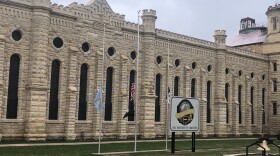Prison reform advocates say incarcerated individuals have been devastated by last month’s killings of two staffers at the Anamosa State Penitentiary. The tragedy has shaken both Department of Corrections and employees and inmates, many of whom knew the victims personally and continue to mourn them.
Incarcerated individuals and staffers alike say there’s a special bond that can develop behind bars. For some, it’s like a family. Advocates say that understandably, employees and inmates were devastated when last month two incarcerated individuals allegedly killed Officer Robert McFarland and Nurse Lorena Schulte during an escape attempt at the sprawling limestone facility in Anamosa.
‘Our lives will never be the same’
Advocate Sue Hutchins of the group Living Beyond the Bars has been corresponding with incarcerated individuals in the wake of the tragedy. At a meeting of prison reform advocate and former corrections workers this week, Hutchins read a message she said was written by a lifer at Anamosa.
“We knew Ms. Schulte and Mr. McFarland just like the town of Anamosa did. In this prison one can't be here for too long without knowing what another person is about. They were good people who came to work, did their jobs and went home, just like we all do within these walls,” Hutchins said, reading from the lifer’s message.
Incarcerated individuals often work closely with prison staff as they carry out a host of job responsibilities behind bars, from plumbing to electrical work to construction and maintenance to medical care.
"Lorena was a person who believed in the success of every incarcerated individual she cared for. She devoted her life to the comfort and safety of the population, oftentimes considered disposable. For those of us who knew Robert McFarland, our lives will never be the same."-an incarcerated individual at Anamosa State Penitentiary, as told to advocate Sue Hutchins
As with many jobs, coworkers often see each other more than they see their own families, hearing about their lives and learning their idiosyncrasies. The same is true behind bars, according to advocates, formerly incarcerated individuals and retired corrections workers. With some corrections employees starting on the job in their early 20s and many incarcerated individuals beginning their sentences around the same age, some say that they grow up together, in a sense.
“For those of us who knew Lorena Schulte, the last few weeks have been unbearable. Lorena was a person who believed in the success of every incarcerated individual she cared for. She devoted her life to the comfort and safety of the population, oftentimes considered disposable,” Hutchins said, reading from a message from another lifer. “For those of us who knew Robert McFarland, our lives will never be the same. ‘Mac’ was a man whose devotion to family and public service was an inspiration to all of us.”
‘They become your family’
Returned citizen Eddie Walker estimates that he spent approximately 60 percent of his time at Anamosa on the medical unit, where he got to know McFarland and Schulte.
“When you spend years around someone, they become your family. You see them more than your family. They're very good people,” Walker said. He underscored the personal relationships that can form between incarcerated individuals and prison employees, and the depth of inmates’ compassion for the victims during this time of tragedy.
“You know, just because someone has made a mistake, doesn't mean they don't have feelings, doesn’t mean they’re not human,” Walker added.
We've been tracking COVID-19 among prisoners. But this data no longer includes new cases from @officialFBOP because they have been removing cases, and now deaths, from their totals. So we can’t accurately count new cases or deaths in federal prisons. https://t.co/79vUgLq2u7
— The Marshall Project (@MarshallProj) April 13, 2021
Advocates call on state to maintain programming, job training
Walker, former corrections officers and the incarcerated individuals that Hutchins corresponded with also heralded the bravery of McKinley Roby, an incarcerated individual who investigators say intervened in the attack and was instrumental in allowing another staffer to escape. Roby had been hospitalized for a traumatic head injury suffered in the attack.
“[Roby] had absolutely nothing to gain and everything to lose. Fortunately, he did not lose his life. His actions epitomize the best of all of us. His actions should show all those who look down upon those of us who are incarcerated, that we are better than some people would give us credit for,” Hutchins read from another message from an incarcerated individual at Anamosa.
Prison reform advocates, returned citizens and retired corrections workers are urging state officials to maintain programming and job training to help rehabilitate those behind bars, despite the tragedy at Anamosa. They hope the actions of the two individuals accused of the murders won’t be used to take away resources, supports and opportunities from those who are working to better themselves and atone for their mistakes.










